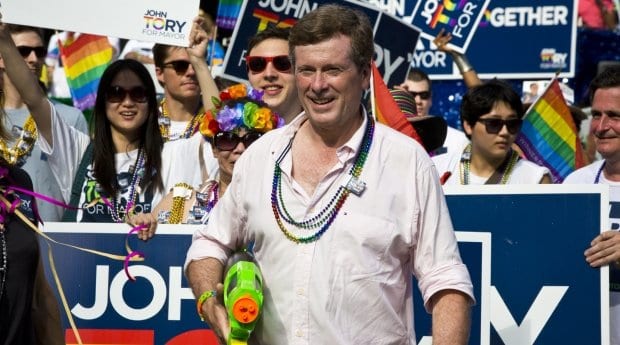This is the second of our profiles of Toronto’s leading mayoral candidates. Find our Olivia Chow profile here. Doug Ford did not respond to our interview requests.
John Tory is enjoying a higher profile in the Church-Wellesley Village these days.
“I was walking by one of the bars, and some guys sitting, having a beer, cheered, so I went and talked to them and they all said they were voting for me,” he explains while sitting in a window seat at the Church on Church bar in early September. Like Chow did earlier in the evening, he’s dropped by to help Proud Politics celebrate the completion of their Out to Win session.
While his opponent for the mayoralty of Toronto has been able to lean heavily on her experience advocating for LGBT rights at both the municipal and federal levels, Tory claims his own history as an ally. As leader of the provincial Progressive Conservative Party from 2004 to 2009, he says that he often took a position on LGBT rights that was contrary to those in his party. “I was not bothered by that because I thought it was important to be a leader when it comes to human rights issues,” he explains.
Tory also claims to have played a role in getting former Toronto mayor Mel Lastman to march in his first Pride parade. “He was reluctant, in part, because he didn’t think it was proper that people should walk naked on the streets, so we said, There will be no problem with that, just come and we’ll keep an eye out for that and make sure everything is fine.” That was the first time Tory has marched in the parade, a habit he has kept up over the years; he notes that he has marched at least eight or nine times since then.
His views on the Pride parade have been cause for concern in the LGBT community, however. On Sept 19, he said in two separate debates that he would support ending city funding for Pride if Queers Against Israeli Apartheid were to march again. Tory has held this view publicly for some time, but when it was brought up with just over a month left in the campaign it created controversy that drove the news cycle for several days.
Both the city manager and the city solicitor had previously determined that the phrase “Israeli apartheid” does not violate any city discrimination policies.
Tory had previously said that he would be willing to change Toronto’s discrimination policy, and he hasn’t wavered from his position — Xtra’s videography team recently talked to him at the Toronto Real Estate Board debate, where he reiterated that he would want to change the City of Toronto’s discrimination politics so the term “Israeli apartheid” could not be used by city-funded organizations.
On other key issues — a homeless shelter for LGBT youth, a permanent memorial for trans people and development in the Village — Tory’s responses are measured. He supports the first two and wants the Village to retain its character, though he mentions, consistently, that it’s important to him to talk to the community before moving forward with definitive plans.
What he wants, overall, is to bring people together, he says. And, he assures, he will march in the Pride parade if elected mayor.
“Why would you not be in the Pride parade?” he asks. “To me, the Pride parade is more fun than you can have anywhere else in the city.”


 Why you can trust Xtra
Why you can trust Xtra


